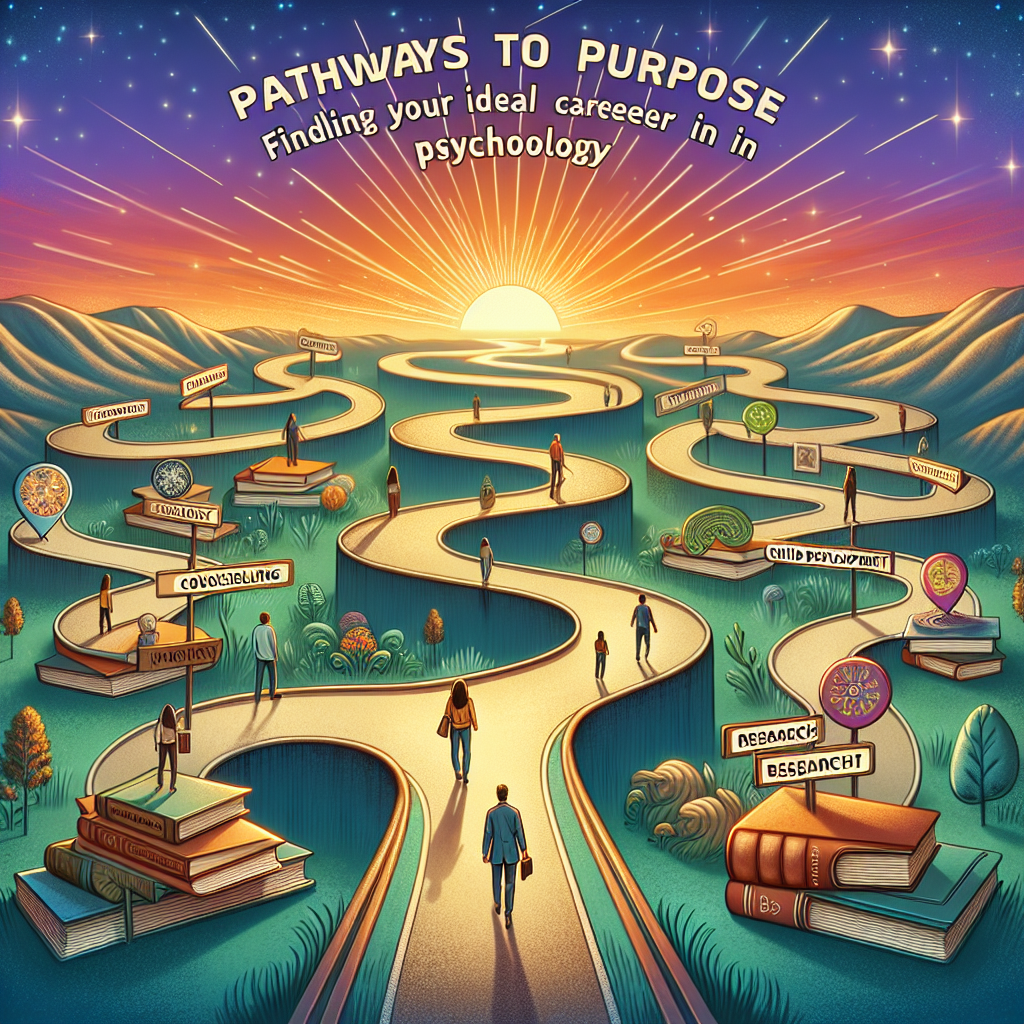
Introduction
In a world that constantly evolves, the quest for purpose in one’s career has become more urgent than ever. The field of psychology offers a myriad of paths that not only promise professional satisfaction but also the chance to create an impact. Whether you’ve just graduated or are contemplating a career pivot, understanding the diverse opportunities in psychology can launch you toward a fulfilling career. This guide—Pathways to Purpose: Finding Your Ideal Career in Psychology—will navigate you through the intricate landscape of psychology careers, helping you uncover where your skills, interests, and passions intersect.
Understanding the Landscape of Psychology Careers
The Broad Scope of Psychology
Psychology is not a monolith; it encompasses various specializations that cater to different interests and skill sets. From clinical psychology, which focuses on diagnosing and treating mental health issues, to industrial-organizational psychology, aimed at enhancing workplace productivity, the options are vast.
Table 1: Major Areas of Psychology
| Area of Psychology | Key Focus | Typical Work Environment |
|---|---|---|
| Clinical Psychology | Mental health treatment | Hospitals, private practice |
| Counseling Psychology | Personal issues | Schools, community centers |
| Industrial-Organizational Psychology | Workplace behavior | Corporations, consultancy firms |
| Forensic Psychology | Law and criminal justice | Courtrooms, law enforcement |
| Developmental Psychology | Human growth and evolution | Research facilities, schools |
Understanding these different areas is crucial in Pathways to Purpose: Finding Your Ideal Career in Psychology. By identifying your interest, you can better navigate your academic and professional journey.
Self-Assessment: Uncovering Your Interests and Strengths
Before diving deeper into specific careers, it’s important to conduct self-assessment. Identify your strengths, weaknesses, interests, and values. Tools such as personality assessments or career quizzes can provide valuable insights.
Case Study: Sarah the Aspiring Therapist
Sarah recently completed her undergraduate degree in psychology. After taking a career assessment, she realized her strong empathetic nature paired well with a career in clinical psychology, where understanding and helping others is a priority. This self-awareness guided her to pursue a master’s degree in counseling, emphasizing the importance of self-assessment in Pathways to Purpose: Finding Your Ideal Career in Psychology.
Educational Pathways: Degrees and Certifications
Essential Degrees in Psychology
Your educational journey will significantly shape your career opportunities in psychology. Here’s a brief overview of the common degrees available:
- Bachelor’s Degree: Offers foundational knowledge and may open doors to entry-level jobs or graduate studies.
- Master’s Degree: Essential for clinical roles, this degree often leads to licensure and specialized training.
- Doctoral Degree (Ph.D. or Psy.D.): Required for advanced practice roles, teaching positions, and conducting research.
Table 2: Degrees and Career Opportunities
| Degree Type | Typical Career Roles |
|---|---|
| Bachelor’s | Research assistant, case manager |
| Master’s | Licensed counselor, organizational psychologist |
| Doctoral | Clinical psychologist, academic researcher |
Additional Certifications
In addition to degrees, certifications can enhance your employability. Areas such as substance abuse counseling or applied behavior analysis often require specific certifications.
Case Study: Mark the I-O Psychologist
Mark held a bachelor’s degree in psychology but pursued a master’s in industrial-organizational psychology. His decision was guided by his passion for optimizing workplace efficiency. The additional degree and certification allowed him to secure a role in a Fortune 500 company, highlighting the necessity of continuous education on your Pathways to Purpose: Finding Your Ideal Career in Psychology.
Gaining Experience: Internships and Volunteer Work
One of the most effective ways to explore your interests in psychology is through hands-on experiences. Internships, volunteer positions, or part-time roles can provide invaluable insights and practical skills.
The Importance of Networking
During your internships, networking becomes vital. Building relationships with professionals in psychology can lead to mentorship, job opportunities, and industry insights.
Case Study: Maria the Student Volunteer
While pursuing her master’s in counseling, Maria volunteered at a local crisis center. Not only did she gain practical experience, but she also made connections that later assisted her in securing a post-graduation position in the same center. Maria’s story emphasizes how internships and networking contribute to Pathways to Purpose: Finding Your Ideal Career in Psychology.
Exploring Diverse Career Options
Clinical and Counseling Roles
If your passion lies in therapy and treatment, roles in clinical or counseling psychology might be ideal. These professions require empathy, patience, and strong communication skills.
Research and Academia
For those interested in the scientific aspect of psychology, research or academia can be fulfilling pathways. Pursuing a Ph.D. in psychology can lead to teaching positions or conducting groundbreaking research.
Corporate Psychology
With rising interest in workplace well-being, industrial-organizational psychology has become vital. Professionals in this field improve employee satisfaction and operational efficiency.
Forensic Psychology
Blending psychology and law, forensic psychologists work with criminal cases, providing insights into criminal behavior. Positions can be found in law enforcement and rehabilitation centers, making it an exciting field for those interested in the justice system.
Case Study: Alex the Forensic Psychologist
Alex’s fascination with criminal behavior led him to pursue forensic psychology. His role at a state correctional facility allowed him to use his expertise to assist in rehabilitation efforts, demonstrating the diverse opportunities available on Pathways to Purpose: Finding Your Ideal Career in Psychology.
Building a Professional Brand
Online Presence
In today’s digital age, professionals in psychology must emphasize their online presence. A LinkedIn profile, personal website, or professional blog can help you establish credibility and network with other professionals.
Continuous Learning and Development
Staying updated on the latest research, attending workshops, and pursuing additional certifications are vital in psychology. Engaging in lifelong learning will not only enrich your knowledge but will also keep your career trajectory upward.
Conclusion
Finding your ideal career in psychology is an engaging journey filled with exploration, self-discovery, and continuous learning. With numerous pathways available, Pathways to Purpose: Finding Your Ideal Career in Psychology invites you to take the plunge into this rewarding field. Remember that your unique experiences and passions will illuminate your path. As you embark on this journey, keep your heart open, stay curious, and embrace the challenges ahead. Purpose is waiting for you!
FAQs
1. What are the first steps in pursuing a career in psychology?
Start with self-assessment to identify your interests and strengths, followed by obtaining the necessary educational qualifications.
2. Do I need a master’s or doctoral degree to work in psychology?
While a bachelor’s degree allows for entry-level positions, advanced roles typically require a master’s or doctoral degree.
3. Are internships important in psychology?
Absolutely! Internships provide hands-on experience, networking opportunities, and insights into your career path.
4. What specializations are available in psychology?
Specializations include clinical psychology, counseling psychology, industrial-organizational psychology, forensic psychology, and developmental psychology.
5. How can I stay updated on developments in psychology?
Participate in workshops, subscribe to psychology journals, join professional organizations, and attend conferences.
By following these insights, you can confidently navigate your Pathways to Purpose: Finding Your Ideal Career in Psychology, ensuring that you contribute positively to the field while achieving personal fulfillment.















